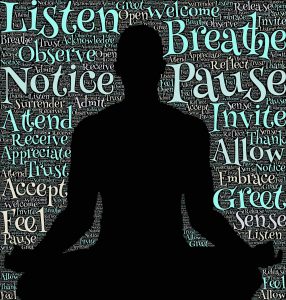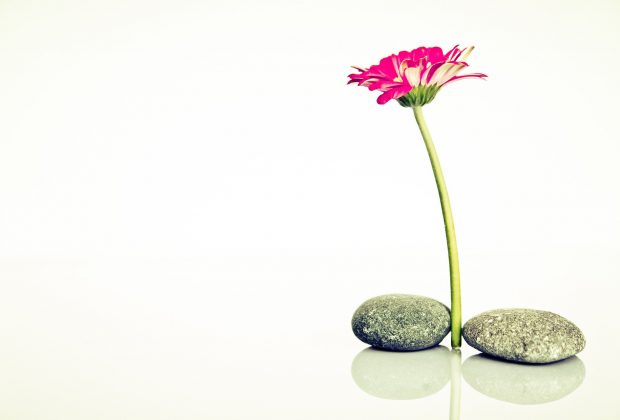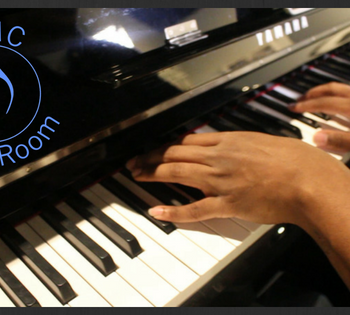By Brittany Donnor
One of the greatest benefits of applying contemplative practices in your everyday life is that it promotes mindful meditation, an essential component to be a multi-tasking nurse. With consistency anyone can develop the skills to get them through stressful situations that don’t only occur in the workplace. I had the opportunity to work with alongside a young woman who currently works in the MedSurg department at a local Baltimore Hospital. Shautria works night shifts as a patient care technician (PCT); she is a student at Coppin University where she is studying nursing and has almost two years of experience working in the busy hospital setting. After she learned about contemplative practice and how greatly health care workers benefit from the therapeutic methods, she decided to try it. Her four-day journey of contemplative practices not only improved her work life, but made her aware of her mental strengths.
On the first day of the experiment three minutes of breathing exercise helped her relieve tension she started experiencing while caring for a patient suffering from alcohol abuse and tending to a young patient who had severe autism and behavioral issues. With the support from those exercises and her coworkers, she was able to survive another busy night.
Day two consisted of her sitting with a patient for twelve hours. As a PCT, it is normal that you may be given the task of supervising a patient in need with companionship and care.
Surprisingly, this was not a problem for Shautria. As they both walked the hallways, she found herself relaxed and focused more on her breathing exercises. Despite the patient’s psych behavior, Shautria was able to manage to have 30 minutes to herself to help her clear her mind and listen to her music.
On the third day she described her shift as being very typical and thus stressful. “Nothing was out of the ordinary for me”, she says. This hectic night for Shautria consisted of being responsible for ten patients all of whom had different needs and care. With so much going on, she mentioned that she had a mental breakdown (a common factor of burnout) and was filled with self-doubt, causing her to dread the rest of her shift. After clocking out at 7:30 am, she still had to catch the bus to get to her morning class on time while feeling restless and physical discomfort. “The only form of stress I’m feeling now is my aching shoulders from pulling on patients and the thought of having to go to class right after work,” she told me. She said the support from her boyfriend got her through this rough period. She finds it comforting venting to him about any of her stressful days because he listens and gives her helpful advice. They pray together which is a contemplative method that spiritually directs her into positive thoughts and reassures her faith in God; religion has always played an important aspect of her life in which she considers one of her health exercises. Although it may seem that the workload got the best of her, she maintained mindfulness meditation.
On the fourth day she was able to get through another shift with a bit more ease; with her familiarity with the demands of her job, she was able to prepare ahead, avoiding a mental breakdown. Instead of overthinking, when she found herself in the middle of quietness, she pray and keep an optimistic attitude. She acknowledges that when she is under pressure that she tends to create internal demands that soon set her up for failure and the repeating feeling of self-doubt. The method of her reassuring that she is powerful than her fears became a new mindfulness practice, and, in the end, she was able to say that her last day was the best of them all.
Having the experience to experiment with a four-day exercise of contemplative practice on a student who is going through the process of obtaining her degree in nursing was eye-opening. I was able to witness the effect of mindfulness meditation and its ability to change the perspective of someone undergoing mental, emotional, and physical stress in every aspect of their life. As for Shautria, once she got into the habit of her practices, she continued them as she saw positive results in her work ethic and how differently she viewed tough situations. Contemplative practice is a means to a finer and healthier lifestyle; it is essential that more people are educated on its effects and the self-awareness that it reveals. Self-awareness of your thoughts, environment, emotions, habits, and physical being are key to self-improvements which can increase the overall wellbeing of an individual. It serves as a critical component to health professionals as their work environments are known to be demanding. Shautria’s experience has made me aware that we hold the key to being resilient, and how we choose to create a greater state of harmony and balance within our own bodies can mentally sustain us for any obstacle.














